北师大版(2019) 选择性必修 第一册Unit1 Relationships Lesson 2 How Do We Like Teachers' Feed back课件(共21张PPT,内嵌音频)
文档属性
| 名称 | 北师大版(2019) 选择性必修 第一册Unit1 Relationships Lesson 2 How Do We Like Teachers' Feed back课件(共21张PPT,内嵌音频) |
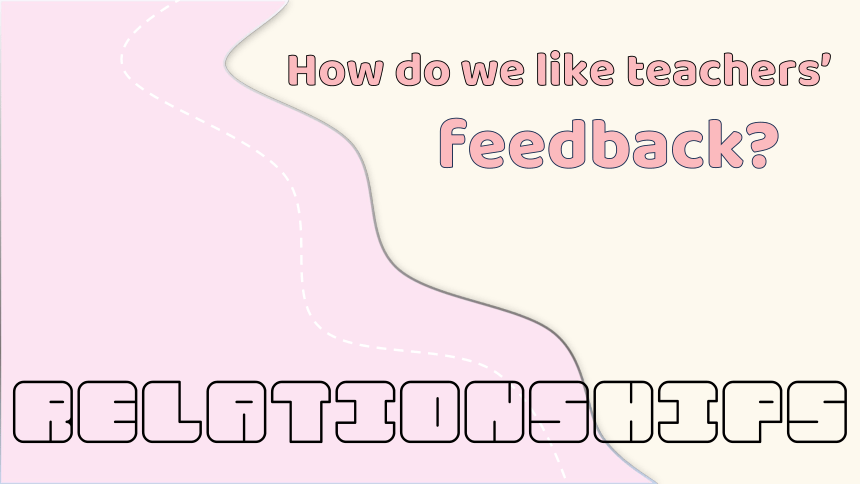
|
|
| 格式 | pptx | ||
| 文件大小 | 6.9MB | ||
| 资源类型 | 教案 | ||
| 版本资源 | 北师大版(2019) | ||
| 科目 | 英语 | ||
| 更新时间 | 2024-09-08 14:03:36 | ||
图片预览

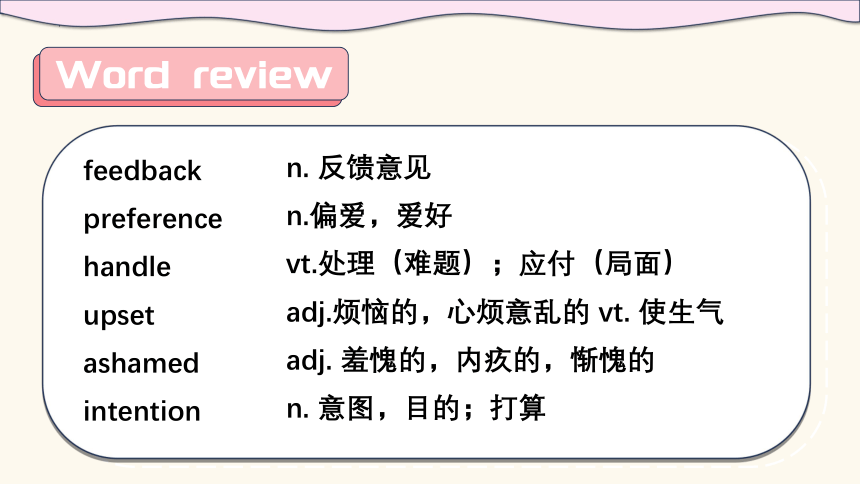
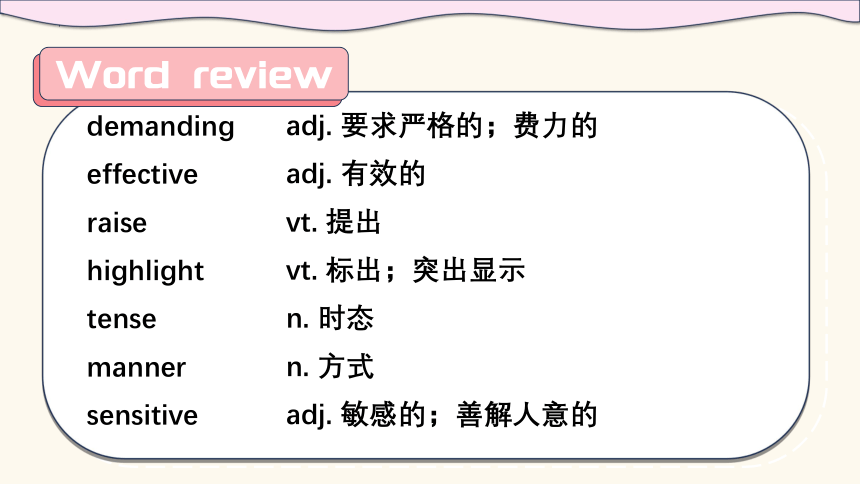
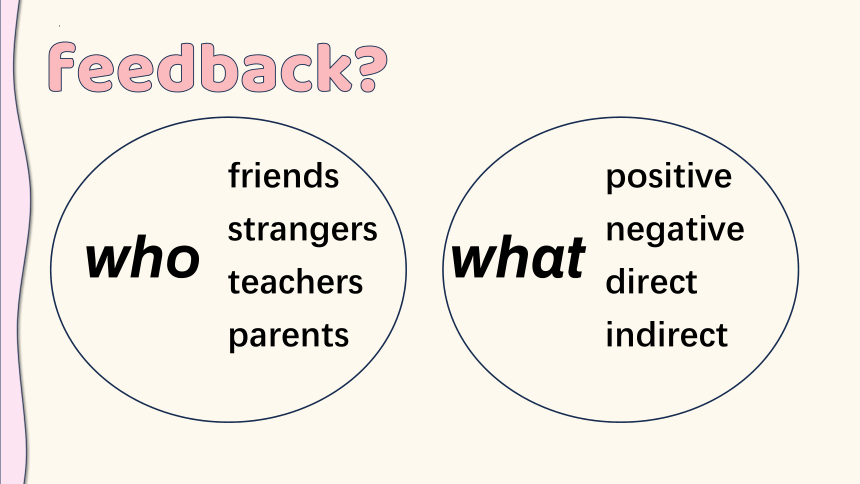
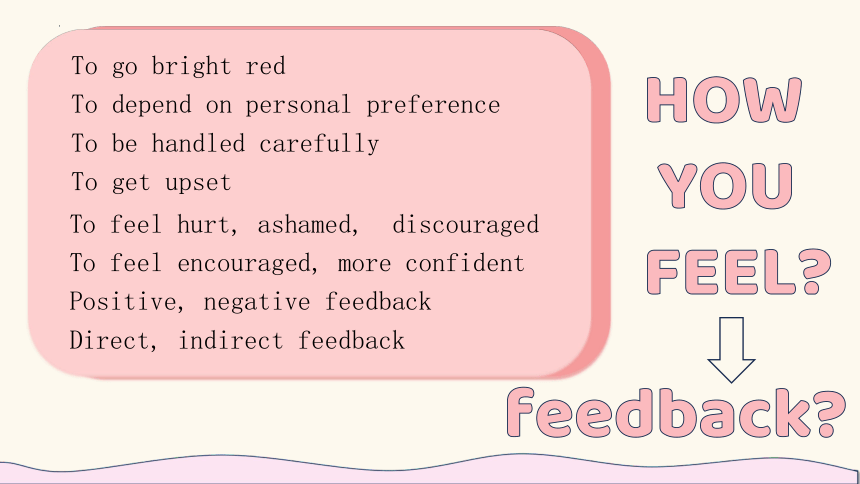
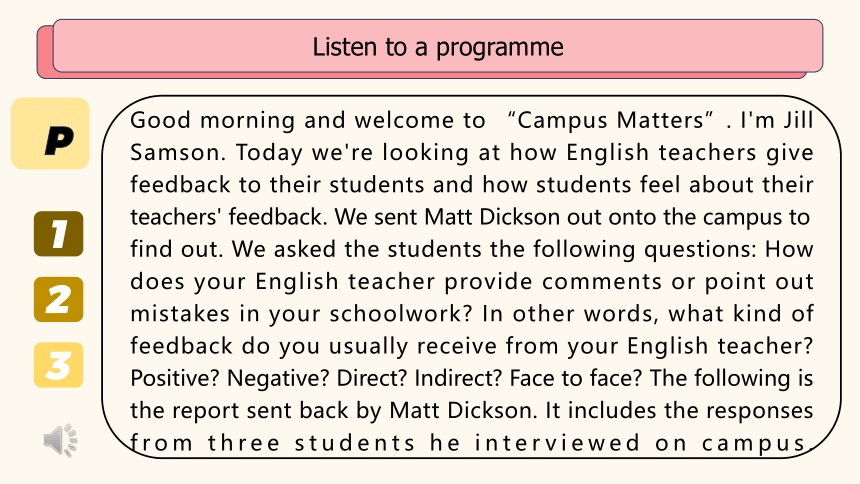

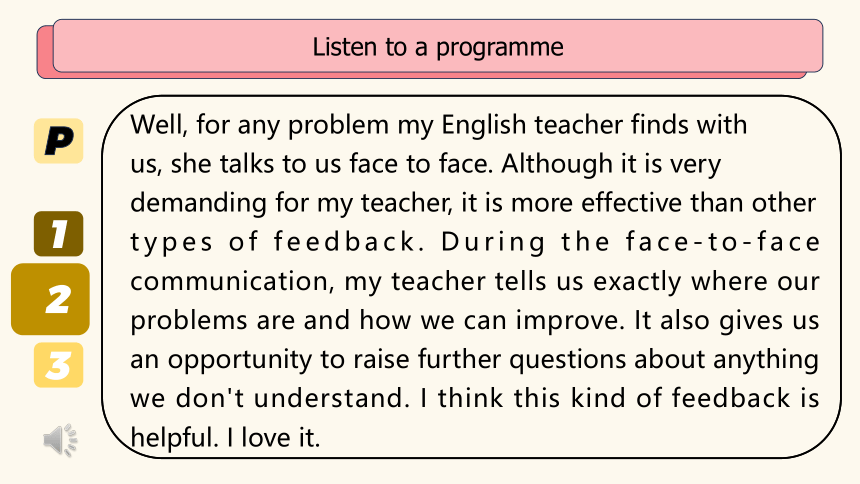
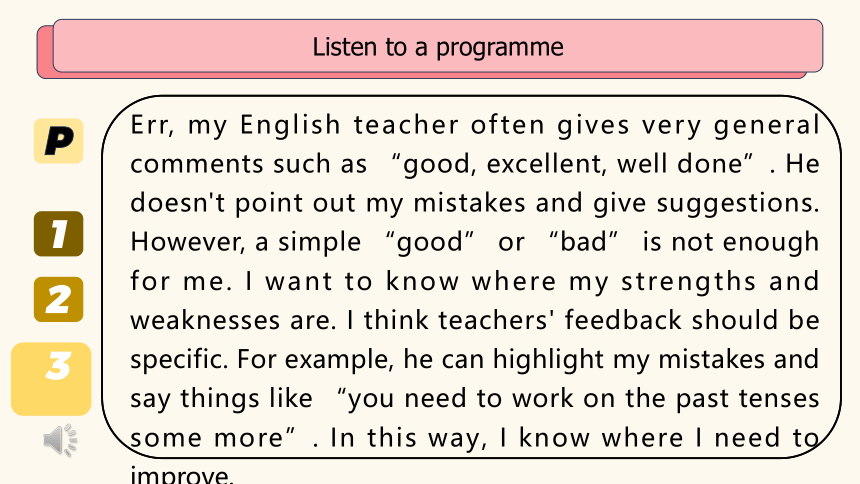
文档简介
(共21张PPT)
feedback
preference
handle
upset
ashamed
intention
n. 反馈意见
n.偏爱,爱好
vt.处理(难题);应付(局面)
adj.烦恼的,心烦意乱的 vt. 使生气
adj. 羞愧的,内疚的,惭愧的
n. 意图,目的;打算
demanding
effective
raise
highlight
tense
manner
sensitive
adj. 要求严格的;费力的
adj. 有效的
vt. 提出
vt. 标出;突出显示
n. 时态
n. 方式
adj. 敏感的;善解人意的
friends
strangers
teachers
parents
positive
negative
direct
indirect
To go bright red
To depend on personal preference
To be handled carefully
To get upset
To feel hurt, ashamed, discouraged
To feel encouraged, more confident
Positive, negative feedback
Direct, indirect feedback
Listen to a programme
Good morning and welcome to “Campus Matters”. I'm Jill Samson. Today we're looking at how English teachers give feedback to their students and how students feel about their teachers' feedback. We sent Matt Dickson out onto the campus to find out. We asked the students the following questions: How does your English teacher provide comments or point out mistakes in your schoolwork In other words, what kind of feedback do you usually receive from your English teacher Positive Negative Direct Indirect Face to face The following is the report sent back by Matt Dickson. It includes the responses from three students he interviewed on campus.
Listen to a programme
Hi my English teacher usually points out our mistakes or problems in front of the whole class. And I have to say most of her feedback is negative. To be honest, I sometimes feel quite hurt by her negative feedback. It makes me lose confidence in myself. But I do understand my teacher's intention. She is very strict and demanding because she wants us to be better learners. I really wish she could be less direct and more encouraging.
Listen to a programme
Well, for any problem my English teacher finds with
us, she talks to us face to face. Although it is very
demanding for my teacher, it is more effective than other types of feedback. During the face-to-face communication, my teacher tells us exactly where our problems are and how we can improve. It also gives us an opportunity to raise further questions about anything we don't understand. I think this kind of feedback is helpful. I love it.
Listen to a programme
Err, my English teacher often gives very general comments such as “good, excellent, well done”. He doesn't point out my mistakes and give suggestions. However, a simple “good” or “bad” is not enough for me. I want to know where my strengths and weaknesses are. I think teachers' feedback should be specific. For example, he can highlight my mistakes and say things like “you need to work on the past tenses some more”. In this way, I know where I need to improve.
How the interviewee’s teacher gives feedback Types of feedback Students’ reactions/ feelings
Student 1 Usually points out our in front of the
Student 2 Talks to us where our problems are and how we can improve. Gives us an opportunity to about anything we don’t understand.
Student 3 Gives very such as “good, excellent, well-done" Doesn’t my mistakes and gives suggestions.
Negative
Positive
Direct
Indirect
mistakes and problems
whole class
feel quite hurt
lose confidence
face to face
tells us exactly
helpful
raise further questions
general comments
point out
not enough
Matt Dickson interviewed three students about their feelings of English teachers‘ 1.________. The first student thinks his teacher’s feedback is negative and makes him lose 2.__________. But he understands her 3._________. The second student thinks the feedback from her teacher is more 4.____ _ _ even though it is more 5. _ ______ for her teacher. She can raise 6.________ questions about anything she doesn‘t understand. The third student thinks his teacher often gives very general 7._______ __. But he wants to know where his 8.___ ______ and weaknesses are. He thinks feedback should be 9.____ ____. For example, the teacher can 10._____ ____ his mistakes and say things like “You need to work on the past 11.____ __.”
Listen to a programme
feedback
confidence
intention
effective
demanding
further
comments
strengths
specific
highlight
tenses
Listen to the conversation between two professors about giving teachers’ feedback to students. Find out their reasons and opinions.
Professor
Jones
Professor
Smith
Professor
Jones
Professor
Smith
Opinions
Reasons
Professor Smith Try to give feedback in a less direct manner. Understand some students' feelings about direct feedback.
Negative feedback might hurt students' confidence and interest in learning.
Professor Jones It is best to point out students' problem directly. Students need to get used to tough comments when they don't do good work.
Exchanging Opinions
I see your point
I believe
I can agree with
I think
_____ ___ it is best to point out students' problem directly.
Also, ______ _ they should realize that any feedback isn't personal.
________ __ ____ you about that, but to be more helpful …
______________. Perhaps I should try that.
I think
I believe
I see your point
I can agree with
feedback
preference
handle
upset
ashamed
intention
n. 反馈意见
n.偏爱,爱好
vt.处理(难题);应付(局面)
adj.烦恼的,心烦意乱的 vt. 使生气
adj. 羞愧的,内疚的,惭愧的
n. 意图,目的;打算
demanding
effective
raise
highlight
tense
manner
sensitive
adj. 要求严格的;费力的
adj. 有效的
vt. 提出
vt. 标出;突出显示
n. 时态
n. 方式
adj. 敏感的;善解人意的
friends
strangers
teachers
parents
positive
negative
direct
indirect
To go bright red
To depend on personal preference
To be handled carefully
To get upset
To feel hurt, ashamed, discouraged
To feel encouraged, more confident
Positive, negative feedback
Direct, indirect feedback
Listen to a programme
Good morning and welcome to “Campus Matters”. I'm Jill Samson. Today we're looking at how English teachers give feedback to their students and how students feel about their teachers' feedback. We sent Matt Dickson out onto the campus to find out. We asked the students the following questions: How does your English teacher provide comments or point out mistakes in your schoolwork In other words, what kind of feedback do you usually receive from your English teacher Positive Negative Direct Indirect Face to face The following is the report sent back by Matt Dickson. It includes the responses from three students he interviewed on campus.
Listen to a programme
Hi my English teacher usually points out our mistakes or problems in front of the whole class. And I have to say most of her feedback is negative. To be honest, I sometimes feel quite hurt by her negative feedback. It makes me lose confidence in myself. But I do understand my teacher's intention. She is very strict and demanding because she wants us to be better learners. I really wish she could be less direct and more encouraging.
Listen to a programme
Well, for any problem my English teacher finds with
us, she talks to us face to face. Although it is very
demanding for my teacher, it is more effective than other types of feedback. During the face-to-face communication, my teacher tells us exactly where our problems are and how we can improve. It also gives us an opportunity to raise further questions about anything we don't understand. I think this kind of feedback is helpful. I love it.
Listen to a programme
Err, my English teacher often gives very general comments such as “good, excellent, well done”. He doesn't point out my mistakes and give suggestions. However, a simple “good” or “bad” is not enough for me. I want to know where my strengths and weaknesses are. I think teachers' feedback should be specific. For example, he can highlight my mistakes and say things like “you need to work on the past tenses some more”. In this way, I know where I need to improve.
How the interviewee’s teacher gives feedback Types of feedback Students’ reactions/ feelings
Student 1 Usually points out our in front of the
Student 2 Talks to us where our problems are and how we can improve. Gives us an opportunity to about anything we don’t understand.
Student 3 Gives very such as “good, excellent, well-done" Doesn’t my mistakes and gives suggestions.
Negative
Positive
Direct
Indirect
mistakes and problems
whole class
feel quite hurt
lose confidence
face to face
tells us exactly
helpful
raise further questions
general comments
point out
not enough
Matt Dickson interviewed three students about their feelings of English teachers‘ 1.________. The first student thinks his teacher’s feedback is negative and makes him lose 2.__________. But he understands her 3._________. The second student thinks the feedback from her teacher is more 4.____ _ _ even though it is more 5. _ ______ for her teacher. She can raise 6.________ questions about anything she doesn‘t understand. The third student thinks his teacher often gives very general 7._______ __. But he wants to know where his 8.___ ______ and weaknesses are. He thinks feedback should be 9.____ ____. For example, the teacher can 10._____ ____ his mistakes and say things like “You need to work on the past 11.____ __.”
Listen to a programme
feedback
confidence
intention
effective
demanding
further
comments
strengths
specific
highlight
tenses
Listen to the conversation between two professors about giving teachers’ feedback to students. Find out their reasons and opinions.
Professor
Jones
Professor
Smith
Professor
Jones
Professor
Smith
Opinions
Reasons
Professor Smith Try to give feedback in a less direct manner. Understand some students' feelings about direct feedback.
Negative feedback might hurt students' confidence and interest in learning.
Professor Jones It is best to point out students' problem directly. Students need to get used to tough comments when they don't do good work.
Exchanging Opinions
I see your point
I believe
I can agree with
I think
_____ ___ it is best to point out students' problem directly.
Also, ______ _ they should realize that any feedback isn't personal.
________ __ ____ you about that, but to be more helpful …
______________. Perhaps I should try that.
I think
I believe
I see your point
I can agree with
同课章节目录
- Unit 1 Relationshis
- Lesson 1 Teachers
- Lesson 2 How Do We Like Teachers’ Feedback?
- Lesson 3 So Close,Yet So Fa
- Unit 2 Success
- Lesson 1 Money vs Success
- Lesson 2 Top Five Secrets of Success
- Lesson 3 Getting to the Top
- Unit 3 Conservation
- Lesson 1 The Sixth Extinction
- Lesson 2 War on Plastic Packets
- Lesson 3 The Road to Destruction
